Agriculture has, since the beginning of human civilization, provided food and raw materials for billions of people, as well as livelihoods. In the fast-changing world of today, there is a significantly shaped agriculture sector resulting from technological change, sustainability demands, and the pressure for innovative solutions. A surplus of opportunities has thus opened up for entrepreneurs to exploit this vital industry.
Suppose you have no idea about Agriculture Business Ideas. In that case, this article will walk you through the growing scope, reasons why this kind of industry is an excellent choice for entrepreneurs, and the key point to consider before jumping in.
The Growing Scope of Agriculture Business
Agriculture is no longer just the farm. There are many Agriculture Business Ideas available that have high profit margins. It developed into new technologies, value-added products, and sustainable practices, making it one of the most diversified available fields ever:
Sustainable Agriculture
For example, with global emphasis on environmental conservation, the latest forms of sustainable agricultural practices like organic farming, hydroponics, and aquaponics are becoming popular. These reduce environmental impacts and meet the exigent demand for organic and eco-friendly products.
Technological Advancement
Innovations in Agri-tech have revolutionized the industry. Drones, IoT-based farm management, and AI support the optimum utilization of farm management, reduce waste, and increase productivity. Business houses focused on agri-tech solutions have great prospects.
Value-Added Products
From crop and animal production to processing raw inputs into high-value goods like organic fertilizers, dairy products, and processed foods, agriculture is not limited to cropping. The niches come with higher margins and small marketable opportunities.
Niche Markets and Export Opportunities
Specialized agricultural activities, such as farming exotic fruits, herbal medicine plants, have recently gained ground. Additionally, internationally-excellent quality agricultural products, in demand globally, are expected to provide several opportunities for exports for entrepreneurs who will fulfill the necessary international requirements.
Why Start an Agriculture Business?
Agriculture remains one of the few industries that directly impact society by fulfilling essential needs, particularly in terms of food and raw materials. This significance makes it a strong foundation for would-be entrepreneurs to explore innovative agriculture business ideas. Here’s why it makes for a good fit for would-be entrepreneurs:
High Demand and Profitability
With growth in world population, demand for food and agricultural produce is increasing day by day. Demand is steady and makes the business most stable and profitable.
Contribution to Food Security
An agricultural business has very much to do with food security and sustainability, which are pressing issues in the world today. This indeed gives one a sense of purpose but also appeals to conscious customers who cherish ethical and ecologically friendly businesses.
Diverse Opportunities
Farming is an enormous business area, from conventional farming activities to high-tech applications. Entrepreneurs may opt for an area that would look fashionable to their interests, aptitudes, and resources.
Government Support and Funding
Most governments offer subsidies, grants, and incentives to boost agricultural businesses. Entrepreneurs can leverage those sorts of resources to make their enterprises lighter to begin and bigger to expand.
Explore some profitable Government Franchise Business Ideas.
Factors to Consider Before Starting an Agriculture Business Ideas
An agricultural business should be planned extensively and carefully so that it has a long-term existence. The key points to remember are as follows:
Market Research
No agricultural business venture should be pursued unless you first know the demand in the market, the competition, and what the customers want. This allows you to identify what you must offer them.
Location and Climate
The success of your agricultural business will depend on your location, especially its climate. For example, certain crops produce their best under certain conditions, and livestock farming requires sufficient space and resources.
Initial Investment and Financing
Agribusinesses range from low-cost operations like mushroom farming to a very capital-intensive one like dairy farming or greenhouse agriculture. Assess your finances and seek funding alternatives like loans, grants, or partnerships.
Knowledge and Skills
The technical and practical aspects of your agricultural business must be known. Consider going through courses, workshops, or experts in the field to acquire the required knowledge.
Legal and Compliance Requirements
Make sure that your business meets the local regulations involved, including any permit to be used in the land, environmental regulations and hygiene for food. Failure to meet such regulations can be devastating in terms of litigation costs and monetary losses.
Sustainable Practices
Integrating sustainability protects the environment, and it also attracts mindful customers for the environment. Focus areas remain waste reduction, resource conservation, and organic methods wherever possible.
Top 20 Agriculture Business Ideas
Here are the top 20 Agriculture Business Ideas with low investment that will help you establish a successful business model:
1. Organic Farming

Organic farming has turned out to be one of the highly profitable agriculture business ideas as more and more consumers are becoming conscious of health and environmental issues. This farming is done without synthetic pesticides and fertilizers instead using natural farming practices and sustainable techniques. In the business, careful management of soil and crop rotation and natural pest control will be essential.
While the preparatory time may be lengthy since the soil preparation and obtaining any certification would typically take more time, organic produce fetches a higher price in the market. The increasing demand for organic products in the global markets makes this a very lucrative venture for both small-scale farmers and also for large-scale farms.
- Investment: $10,000 – $50,000 per acre
- Profit Margin: 40-50%
- Requirement: Certified organic land, Knowledge of organic farming, Organic certification, Natural pest control systems, Storage facilities, Marketing networks
2. Vertical Farming

Vertical farming is the future of city farming, making use of each and every vertical space to cultivate crops in controlled environments. This novel farming technique uses hydroponics, aeroponics, or aquaponics systems to grow vegetables, herbs, as well as fruits in vertically stacked layers. The system is very useful in metropolitan areas where productive farmlands are very limited. Vertical farms will operate throughout the year, and do not depend on seasonal weather conditions.
They also use LED light and climate control with automated systems. This process saves water substantially compared to traditional farming while utilizing far more space and crop yields. Technology-driven input determines absolute conditions for growth and eliminates many of the traditional farming problems.
- Investment: $50,000 – $200,000
- Profit Margin: 35-45%
- Requirements: Indoor facility with climate control, Hydroponic/Aeroponic systems, LED growing lights, Automation apparatus, Technical know-how, Environmental control systems
3. Mushroom Farming
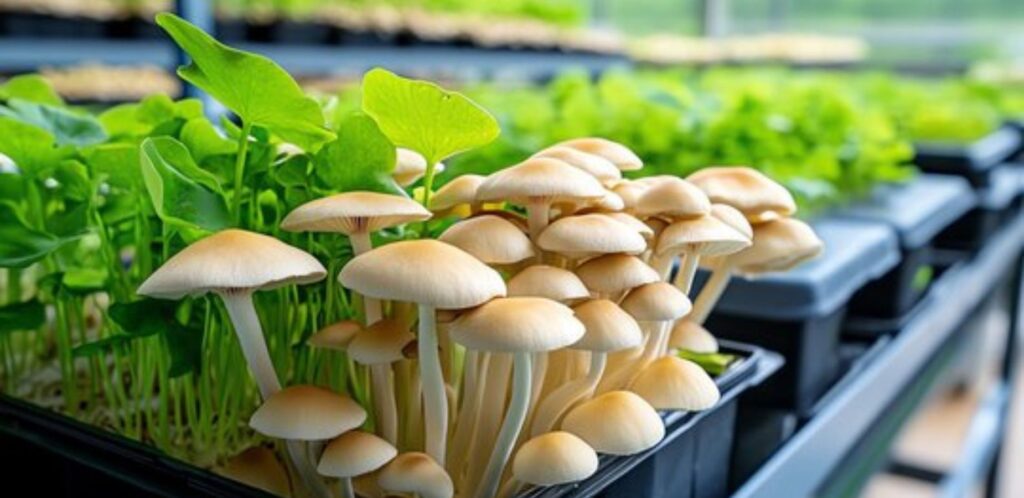
More popular than mushroom farming, because of its potential profitability and relatively low requirements for space, is this agribusiness that can be commenced indoors in a controlled environment. Therefore, it can be used for both urban or rural areas. The different varieties to be grown simultaneously will assist in targeting different market lines, from common button mushrooms to the more exotic varieties like shiitake and oyster mushrooms.
The growing cycle is relatively short, which enables multiple harvests a year. Temperature and humidity control are critical factors in mushroom cultivation, thus directly requiring careful observation and management. With proper marketing strategies, mushroom farming can target both retail and wholesale markets effectively.
- Investment: $15,000 – $40,000
- Profit Margin: 45-55%
- Requirements: Climate-controlled growing room, Sterilization equipment, Spawn production facility, Temperature monitoring systems, Storage facilities, Distribution network
4. Aquaculture
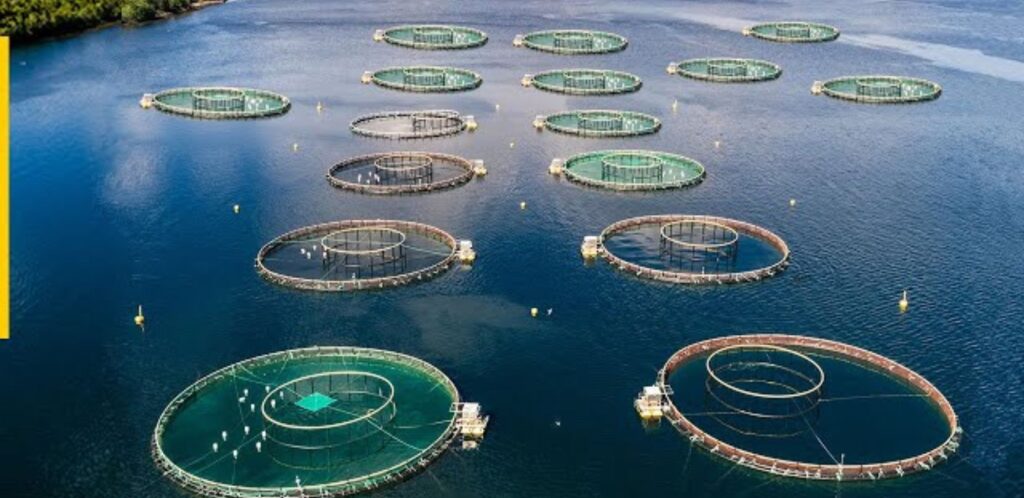
Aquaculture or fish farming is an alternative solution for the increasing global demand for seafood. This business is about producing and raising a fish, crustacean, mollusk, or aquatic plant in controlled conditions. The modern systems of aquaculture can be erected both in freshwater and marine ecosystems; in addition, intensive and extensive farming methods may be employed.
The industry permits various specialization opportunities: it could be about breeding ornamental fish or producing food fish-a tilapia, catfish, or salmon. Large-scale aquaculture enterprises can also be integrated with recycling and waste treatment systems to ensure sustainable environments. The farm should track water quality and the health condition of fish while controlling feed conversion ratios to realize maximum returns on the investment.
- Investment: $30,000 – $150,000
- Profit Margin: 30-40%
- Requirements: Water supply and treatment systems, Fish holding tanks or ponds, Aeration, Feed storehouses, Disease control, Monitoring water quality systems
5. Hydroponic Greenhouse
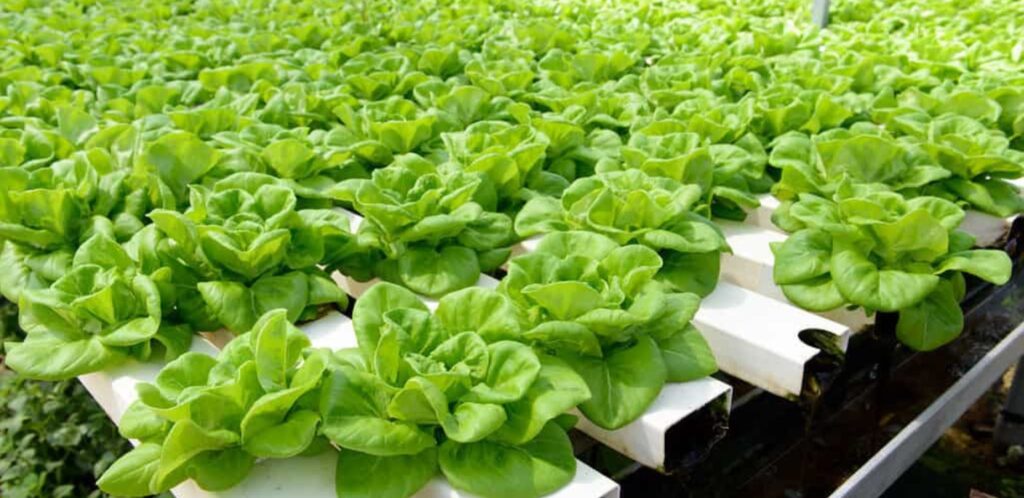
Hydroponic greenhouse farming combines the advantages of controlled environment agriculture with a soil-less growing technique. The modern system of farming allows for year-round productions of crops like tomatoes, lettuce, cucumbers, and herbs. The production is done using nutrient-rich water solutions instead of soil, enabling maximum growth rates and yield per square foot.
High technology can be integrated into advanced greenhouse systems, including automation for climate control, irrigation, and nutrient management. The controlled environment limits pest and disease issues while allowing the exact control of growth conditions. Hydroponic greenhouses can produce significantly more than traditional farming.
- Investment: $40,000 – $100,000 per greenhouse
- Profit Margin: 40-60%
- Requirements: Greenhouse structure, Hydroponic systems, Climate control equipment, Nutrient delivery systems, Monitoring technology, Technical support
6. Apiculture (Beekeeping)

With beekeeping ranging from a hobby to a profitable agribusiness, the industry is a multi-stream revenue earner through honey production, beeswax, and pollination services. The venture will require careful management of bee colonies and knowledge about the behavior and health of bees. Modern beekeeping operations can range from small backyard operations to enormous commercial enterprises servicing the needs of agricultural pollination.
The business model can include direct honey sales, value-added products like cosmetics or candles, and educational services. Successful beekeeping enterprises usually establish collaborations with local farmers for pollination services and maintain good marketing outlets for honey products.
- Investment: $5,000-$25,000
- Profit margin: 35-45%
- Requirements: Beehives and equipment, PPE, Honey extraction equipment, Storage facilities, Processing equipment, Marketing channels
7. Herb Farming

Herb farming has increasingly gained popularity in recent years because both the culinary and medicinal markets require more. For example, herbs that are primarily cultivated include basil, oregano, mint, rosemary, and medicinal herbs such as chamomile and lavender. Because the business can be operated on relatively small land parcels, it is suitable for both urban and suburban areas.
Herb production entails soil quality, irrigation practices, and appropriate harvesting time when the herbs are fully potent and flavorful. The market opportunities are fresh herb sales, dried herbs, essential oils, as well as added values like teas and seasonings. Herb farmers also have partnerships with restaurants, health food stores, and pharmaceutical companies.
- Investment: $15,000 – $30,000
- Profit Margin: 45-55%
- Requirements: Quality soil or greenhouse setup, Irrigation system, Drying facility, Processing equipment, Storage solutions, Distribution network
8. Poultry Farming
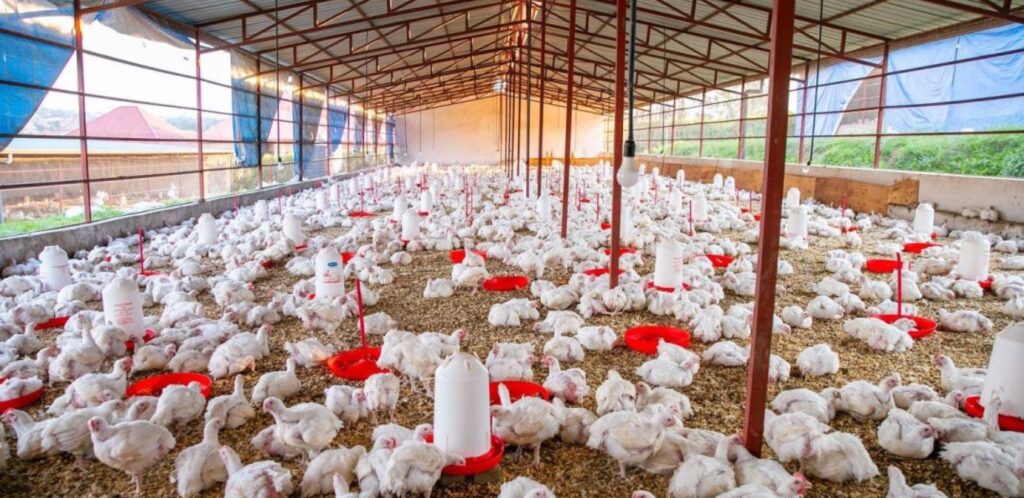
Modern poultry farming, therefore, is the overall process of egg and meat production, from which significant sources of income are generated by performing different operational models. A business can be initiated on backyard operations to large commercial facilities. Big farms engage in the most advanced uses of automated feeding systems, climate control, and waste management solutions for high efficiency of production.
Disease management and measures regarding biosecurity are key to maintaining healthy flocks and, therefore, constant production. Its business model can be an intensive production system, specialised breeding operations, or organic free-range farming. Success tends to depend upon proper immunization and living conditions of the birds.
- Investment: $25,000-$100,000
- Profit margin: 30-40%
- Requirements: Housing facilities, Feeding systems, Climate control equipment, Waste management system, Veterinary services, Processing equipment
9. Microgreens Production
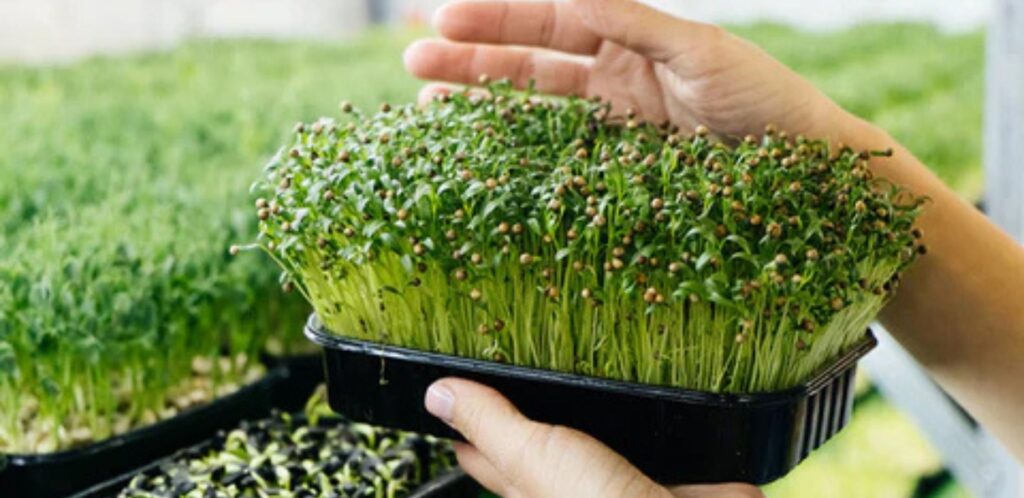
Microgreens farming stands out today as a highly profitable niche in urban agriculture where they serve high-end restaurants and the most health-conscious among consumers. They are young vegetable greens obtained when the first leaves have just developed, rich in intense flavors and full of nutrients. The production cycle is extremely short, typically 7-14 days from seeding to harvest, which can lead to continuous production throughout the year.
Microgreens can easily grow in small spaces by making use of vertical systems, perfect for an urban environment. Production should pay attention to growth conditions, sanitation, and packaging. Getting business sometimes depends highly on relations developed with the local chefs or specialty markets.
- Investment: $10,000-$25,000
- Profit Margin: 50-60%
- Requirements: Indoor growing space, Growing trays and lights, Climate control system, Packaging equipment, Sanitation supplies, Reputable seed sources
10. Seed Production

Commercial seed production is one of the vital agriculture supply chain links in providing opportunities for specialized farm operations. This business involves growing different crops specifically for their seeds under a very careful isolation of the parent lines to maintain genetic purity. Parent plant selection, control of pollination, and proper harvesting and processing techniques all apply. Companies often work under contract with seed companies and have to maintain high-quality control.
The business requires knowledge about plant genetics and breeding principles besides being aware of the various requirements of certification for different categories of seeds. Success depends upon seed quality purity and meeting any particular demand required in the market.
- Investment: $20,000 – $75,000
- Profit Margin: 35-45%
- Requirements: Isolated growing areas, Processing equipment, Storage facilities, Quality control lab, Certification compliance, Distribution systems
11. Exotic Fruit Farming

Exotic fruit farming concerns growing unique and high-value fruits that are not commonly found in most local markets. This is a specialised venture in agriculture, and growing exotic species must be matched with suitable growing conditions and climate for the species. Business ventures into this can involve fruits like dragon fruit, passion fruit, lychee, or special citrus varieties.
Success lies in proper microenvironment creation and effective pest management measures. It is one of the profitable Agriculture Business Ideas. Marketing is key as such products often fetch premium prices in niche markets. Many exotic fruit farmers also create agritourism ventures based on their specialty products.
- Investment: $30,000-$100,000
- Profit Margin: 40-50%
- Requirements: Climate or greenhouse, Specialized growing equipment, Post-harvest handling facilities, Cold storage, Marketing channels, Transportation systems
12. Dairy Farming
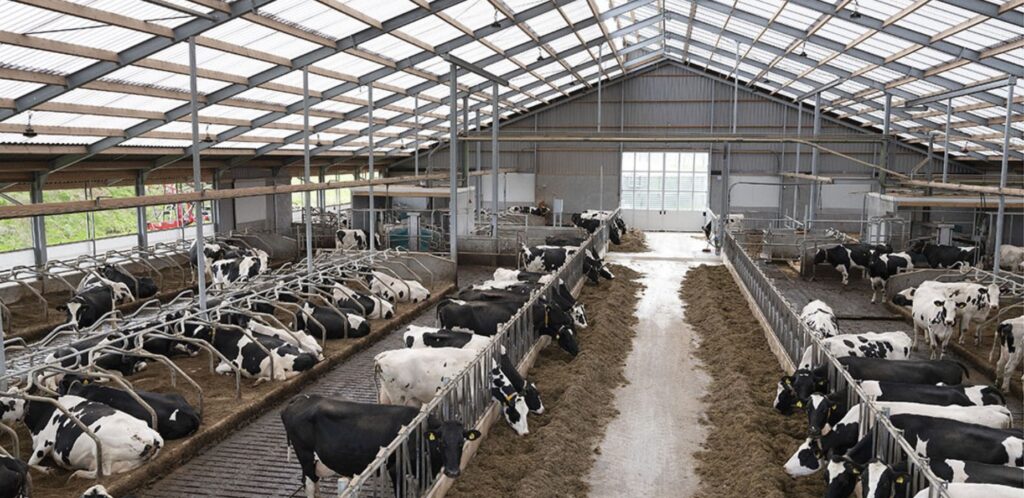
Contemporary dairy farming is a high technology agricultural business that puts emphasis on productive milk production and value addition of dairy products. High dairy operations bring about high attention to animal health, nutrition, and breeding programs to ensure effective milk production. Advanced dairy operations use automated milking machines, waste solutions, and herd management programs. The business model may also include value-added products such as cheese, yogurt, or specialty dairy items.
Dairy farming success requires a balanced approach to controlling feed costs, ensuring animal welfare, and efficient production while maintaining high quality standards. Many successful operations also develop direct marketing channels and farm-to-table programs.
- Investment: $100,000 – $500,000
- Profit Margin: 25-35%
- Requirements: Housing facilities, Milking equipment, Feed storage systems, Waste management, Veterinary care, Processing facilities
13. Medicinal Plant Farming
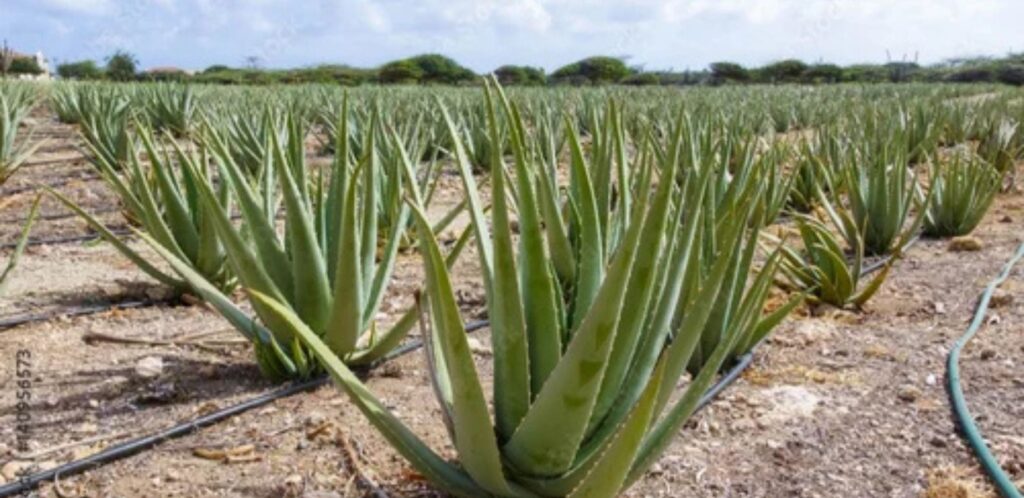
Medicinal plant farming has seen a surge in demand, driven by the pharmaceutical and natural health industries’ increasing need for herbal resources. Crops like aloe vera, turmeric, ashwagandha, and other medicinal herbs are highly sought after for traditional and contemporary health solutions. This niche represents one of the promising money-making agriculture business ideas, as it requires specialized knowledge about plant properties, growth conditions, and maximizing medicinal value.
Success in this field hinges on maintaining strict quality control and ensuring proper post-harvest handling to preserve the potency of active compounds. Establishing strong connections with pharmaceutical companies, herbal product manufacturers, and research organizations is key to standing out in the competitive market. Additionally, incorporating processing facilities to produce value-added products can further enhance profitability, making medicinal plant farming one of the most lucrative money-making agriculture business ideas for aspiring entrepreneurs.
- Investment: $25,000 – $75,000
- Profit Margin: 45-55%
- Requirements: Specialized growing areas, Processing equipment, Quality testing facilities, Storage systems, Certification compliance, Distribution network
14. Flower Farming
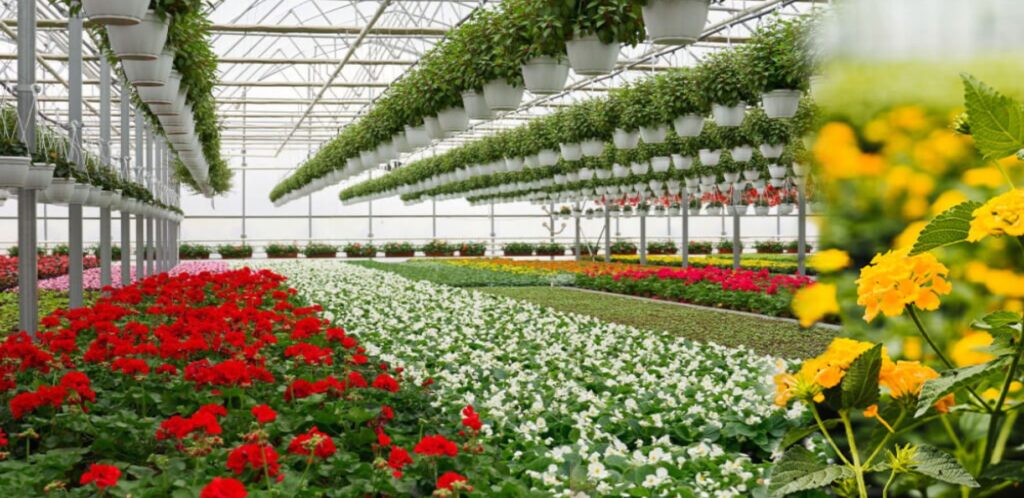
Commercial flower farming combines the agricultural expertise with artistic elements to produce cut flowers and ornamental plants for various markets. The business can be both seasonal and year-round production using greenhouse facilities. Successful flower farms will usually grow a mix of the most popular varieties and specialty blooms to meet diverse market demands, but at all points in time, plantings need to be well-timed to allow for continuous availability throughout the growing season.
Post-harvest handling and cold chain management are essential for maintaining quality of flowers and increasing vase life. Many flower farmers also produce value-added services, including wedding arrangement and subscription programs.
- Investment: $20,000-$50,000
- Profit Margin: 35-45%
- Requirements: Growing fields or greenhouses, Irrigation systems, Cold storage facilities, Packaging supplies, Delivery vehicles, Design workspace
15. Aquaponics
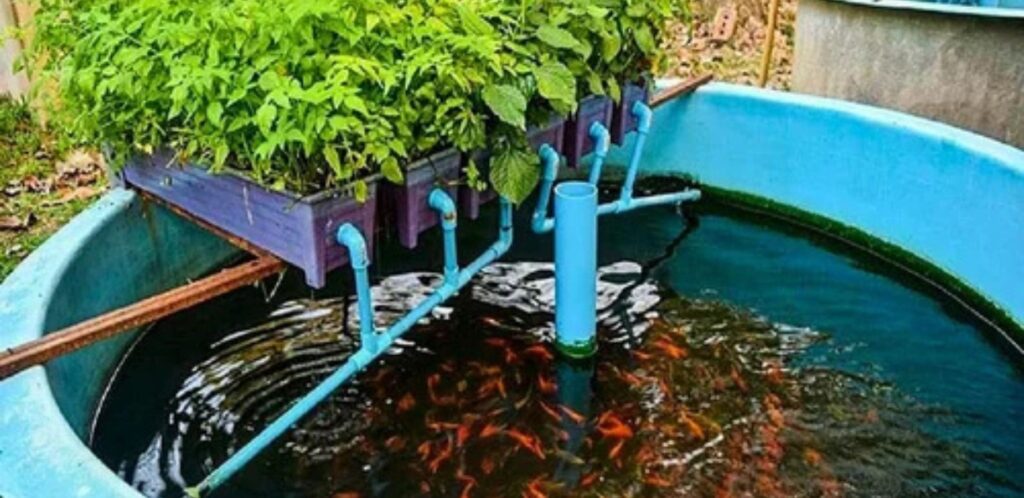
Aquaponics is the innovative integration of aquaculture and hydroponics, providing a symbiotic environment for sustainable production. It focusses solely on fish rearing as a support for soil-less cropping, wherein the waste from the fish serves as a nutrient base for the plants, while the plants help filter water for the fish. The setup of this dual-purpose system makes it one of the most efficient low-cost business ideas in agriculture, producing both fish and a variety of vegetables or herbs.
Aquaponics can be small urban or more large commercial facilities that have varieties in different business needs, and the systems have been designed to monitor and balance the water quality thus making the environment healthy for the plants and fish. Besides, some successful ventures integrate education programs with farm tours, presenting another revenue source. Being a sustainable and innovative product, aquaponics is unique among the low-cost agriculture business ideas for entrepreneurs who look to minimize the costs but maximize their output.
- Investment: $30,000 – $100,000
- Profit Margin: 40-50%
- Requirements: Tank systems, Plant growth beds, Water filtration equipment, Monitoring equipment, Backup power, Technicians
16. Composting Business

This is a business that has emerged as one of the most profitable agricultural businesses in terms of waste management and soil improvement. This business will collect organic waste products and transform them into marketable high-quality compost for agricultural and gardening purposes. Management of the operation is such that proper decomposition and product quality are ensured.
Nowadays, a good deal of high-end composting facilities make use of up-to-date technologies regarding monitoring and control of temperature and aeration. Success often lies in the development of partnerships with municipalities, landscapers, and agricultural operations. Other facilities also come up with specific compost mixes for different purposes.
- Investment: $40,000 to $150,000
- Profits Margin: 30-40%
- Requirements: Processing site, Heavy equipment, Screening systems, Temperature monitoring, Storage areas, Transportation fleet
17. Agricultural Consulting

Agricultural consulting is professional advice given to farmers and agribusinesses on most aspects of agriculture operations. The business requires extensive experience in agricultural practices and current industry trends. Consultants usually specialise in one area, such as crop management, livestock operations, or organic certification.
This would involve soil testing, crop planning, pest management strategies, and advice on the future development of a business. More advanced agricultural consultants take advantage of technology tools to analyze data and monitor remotely. This field will be a success given that a person keeps up to date with new agriculture technologies as well as developing a sound client network.
- Investment: $5,000-$20,000
- Profit Margin: 50-60%
- Requirements: Technical know-how, Testing equipment, Means of transport, Computer systems, Analytical software, Professional degree
18. Farm Equipment Rental

The farm equipment rental business caters to agricultural operations through the provision of high-cost machinery without having to be owners of it. This farm equipment service business needs to maintain inventory solutions of agricultural equipment for common farming operations. The business model can include short-term and seasonal rentals of tractors, harvesters, and specialized equipment.
Commonly successful operations also offer delivery services and basic operator training. Equipment maintenance and scheduling are significant aspects of the business. Many rental operations also provide operator services for specialized equipment.
- Investment: $100,000-$500,000
- Profit Margin: 35-45%
- Requirements: Equipment fleet, Maintenance facility, Transporting vehicles, Storage yard, Repair tools, Insurance coverage
19. Value-Added Processing
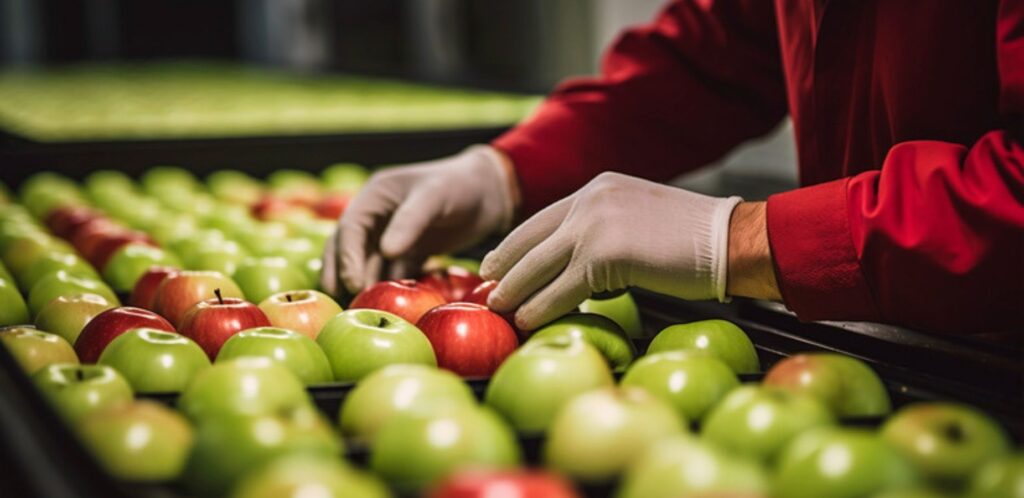
Value-added processing increases the market value of raw agricultural products by processing them into ready-to-consumer items. The business could be processing fruits into jams, vegetables into pickles, or grains into flour products. Operations should have proper food processing facilities and meet food safety regulations.
Products developed and designed for packaging can make or break an operation in the marketplace. Many processing operations have developed signature recipes and unique product lines. Success often requires powerful brands and varied distribution channels.
- Investment: $50,000 – $200,000
- Profit Margin: 40-50%
- Requirements: Processing facility, Equipment and machinery, Storage systems, Packaging supplies, Quality control lab, Distribution system
20. Agri-Tourism

Agri tourism is an agricultural-based tourism product where one has a traditional farming of hospitality services. The kinds of activities which one can find in this business model are farm tours, harvest festivals, educational programs and also on-farm accommodation. The venture typically combines several sources of revenue, including sales of a product directly related to an operation, workshops, and special events.
Profitability hinges on the ability to design appealing programs that focus attention on agricultural practices and safety and comfort for the visitor. Many agritourism operations also focus on seasonal events or themes throughout the year. The business balances agriculture and tourism.
It would be best if you learned how to become a travel agent in India before investing in the business model.
- Investment: $25,000 – $100,000
- Profit Margin: 30-40%
- Requirements: Visitor facilities, Safety measures, Event spaces, Parking areas, Marketing Literature, Insurance Coverage
How to Choose the Right Agricultural Business Idea
When you choose the best Agriculture Business Ideas, you need to put in plenty of planning and evaluation. Here are some guidelines to follow;
Identify Your Interests and Skills
First of all, you should seek areas of agriculture that you are interested in. If you are interested in working with plants, then crop-based businesses such as organic farming or hydroponics would be ideal. If you would like to have something to do with animals, then livestock farming or beekeeping would be better.
Carry out Market Demand Research
Establish prevailing trends and demands in your niche market. Now, the latest rage includes organic products, medicinal herbs, and sustainable farming practices. Select an idea that satisfies such needs, but at the same time, serves your purpose. .
Assess Location and Resources
Ensure consideration of land availability, water, and climate conditions that are dominant in your area. There is some crop or livestock that grows naturally only in specific environments. Such should be chosen in line with your location.
Consider Investment and Scalability
Evaluate how much you’re willing to invest. Small-scale businesses like mushroom farming require low initial capital, while greenhouse farming or aquaculture may need higher investments. Also, ensure your chosen idea can scale as your business grows.
Discover Some New Topics:
- Franchise Business in India
- Most Profitable Business Ideas in the Textile Industry
- Transport Business Ideas
Conclusion
Money-making Agriculture Business Ideas offers a great deal of variety, from traditional agriculture to modern, high-tech solutions. Choosing an idea for agriculture based on all the factors – your interest in it and demand in the market, along with the resources you have for the same – can make it very profitable and fulfilling. Whether you are aiming at producing food or value-added products or offering innovative services, agriculture remains a tough and rewarding business.
FAQs
1. What are some low-cost Agriculture Business Ideas?
Mushroom farming, organic fertilizer production, and beekeeping are cost-effective options.
2. What is the most profitable agricultural business?
Organic farming, hydroponics, and exotic fruit cultivation tend to be highly profitable.
3. How do I start an agricultural business without land?
Yes, hydroponics, vertical farming, and agri-tech services are not land-intensive.
4. What are the trending agriculture businesses?
Organic farming, medicinal herb cultivation, and agri-tech solutions are in demand nowadays as sustainability calls the shots.

